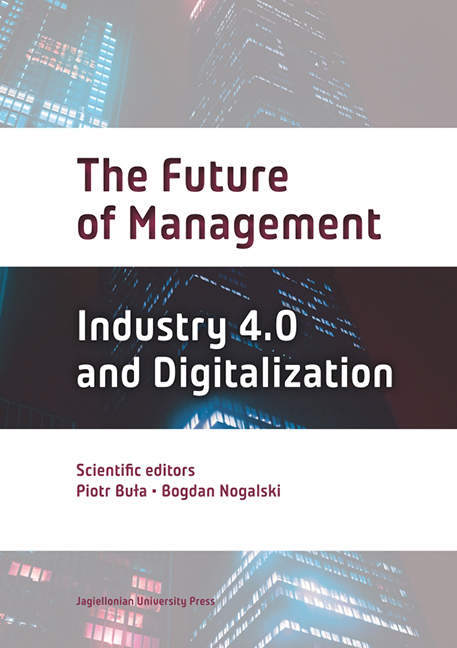Book contents
- Frontmatter
- Contents
- Preface
- Industry 4.0: Social Impacts and Operations Management Challenges
- Business Model Changes in the Presence of Challenges Brought by Industry 4.0
- Communication in Traditional and Network Organisation: Transformation
- Consequences of the Fourth Industrial Revolution in Social and Economic Development in the 21st Century
- Ideology, Trust, and Spirituality: A Framework for Management Control Research in the Era of Industry 4.0
- Renewable Energy through Industry 4.0 on the Example of Photovoltaic Development in Selected European Countries
- Employee Loyalty in the ICT Sector as a Challenge for Building Industry 4.0
- The Importance of Flexibility of Human, Tangible and Intangible Resources in Selected Production Entrepreneurships: Results of Empirical Research
- Challenges Posed for Universities by the Industry 4.0 Environment
- Big Data in Managing Marketing Communication
- Mathematical Risk Assessment Method in the Implementation of Logistic Processes
- Management and Digitisation
- Branding of Time as a New Direction in Tomorrow’s Management
- The Future of Branding
The Future of Branding
Published online by Cambridge University Press: 16 November 2021
- Frontmatter
- Contents
- Preface
- Industry 4.0: Social Impacts and Operations Management Challenges
- Business Model Changes in the Presence of Challenges Brought by Industry 4.0
- Communication in Traditional and Network Organisation: Transformation
- Consequences of the Fourth Industrial Revolution in Social and Economic Development in the 21st Century
- Ideology, Trust, and Spirituality: A Framework for Management Control Research in the Era of Industry 4.0
- Renewable Energy through Industry 4.0 on the Example of Photovoltaic Development in Selected European Countries
- Employee Loyalty in the ICT Sector as a Challenge for Building Industry 4.0
- The Importance of Flexibility of Human, Tangible and Intangible Resources in Selected Production Entrepreneurships: Results of Empirical Research
- Challenges Posed for Universities by the Industry 4.0 Environment
- Big Data in Managing Marketing Communication
- Mathematical Risk Assessment Method in the Implementation of Logistic Processes
- Management and Digitisation
- Branding of Time as a New Direction in Tomorrow’s Management
- The Future of Branding
Summary
Abstract
In recent years, technological innovations, especially in the area of communication and information exchange have significantly accelerated. Under these conditions, brands cannot rely on a previously acquired position and their long-standing heritage, but they must actively seek new forms of reaching the minds and hearts of consumers. The main purpose of the article is to answer the question about the future of brands and their importance for the success of companies. An attempt to find answers to the above questions in the article was carried out based on the analysis of results of rankings of the most valuable global and Polish brands, as well as studies of literature on trends in brand management resulting from technological, social and cultural changes. The main conclusion from conducted research is that brands will remain one of the decisive factors in creating the value of companies. However, methods of building a brand, as well as the way of its value creation will change. Consumers will turn to brands as new institutions that will allow them to meet their more complex needs: meaning, belonging, happiness, fulfilment, self-improvement, etc. As a result, the responsibility of brands will increase, which will cause that they will have to operate in a more transparent and ethical manner.
Keywords: branding, future of brands, brand management, brand value
Introduction
The evolution of the brand from product, through trademark to carrier of unique values, has a long history. The factors that initially served as a tool for a simple exchange of utility, later turned into a carrier of benefits and an element of market protection, to finally become a billion-dollar declaration of the superiority of offered attributes. Companies that have managed to build strong brands gain a lasting competitive advantage in the market, which translates into high margins and a high return on employed capital, which in turn leads to an increase in the company value. In the case of many businesses, the brand is their most valuable asset, which may have as many as several dozen percent shares in their market value. Currently, brands account for 30% of global wealth. In the context of changes that have occurred in recent years on the market, the question about the future of brands is justified.
- Type
- Chapter
- Information
- The Future of ManagementVolume Two: Industry 4.0 and Digitalization, pp. 210 - 225Publisher: Jagiellonian University PressPrint publication year: 2022

